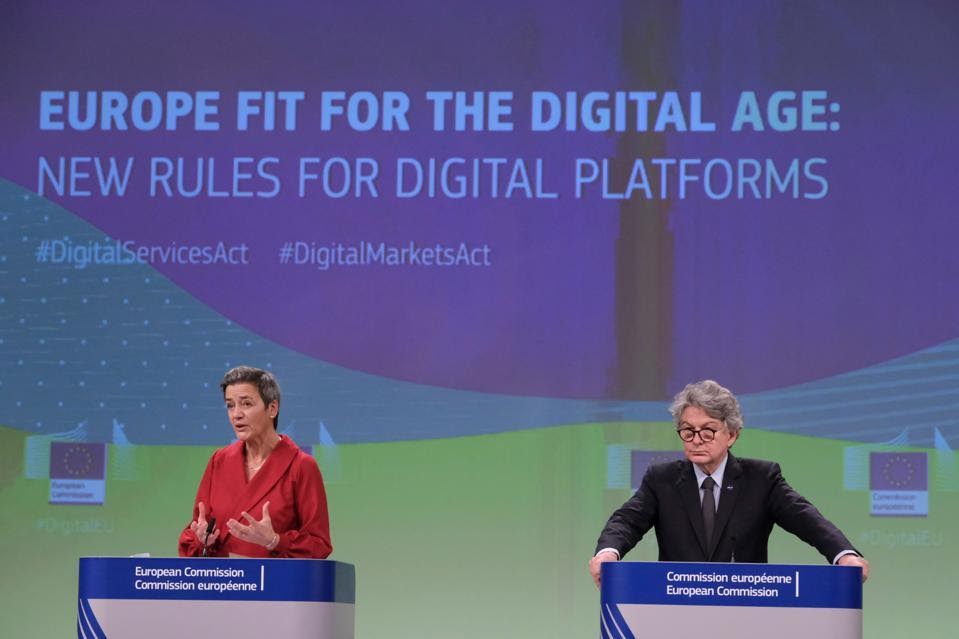The EU launched the Digital Markets Act and the Digital Services Acts (DMA/DSA) on 15 December, the most detailed reworking of the digital regulatory environment to date. Provided that many tech players are willing to comply with the regulation’s ‘highest common denominator’ in order to prevent numerous offerings, and given the EU’s leadership in tech regulation and the US’s appetite to fall into line, these regulations are likely to spread far beyond Europe.

But where’s the area of focus?
Most of the DMA focuses on a more stringent approach to the so-called gatekeepers, i.e. the dominant major tech firms such as Facebook and Google. The Act is the EU’s response to raising impatience with our current regulatory apparatus, which is insufficient to counter the exclusion of competitors and the exploitation of consumers in digital markets. In addition, Europe is worried about missing out in the digital economy, as it happens that “Big Tech” is located in the US.
Who are the gatekeepers?
A gatekeeper is a notably dominant presence who would need to be kept to universal access. The European Commission concentrated primarily on consumer scope, total turnover and market capitalisation in determining what constitutes a gatekeeper. It focused on companies that use their technology platforms across multi-party ecosystems to communicate with partner firms, and established activities that should be banned and controls that should be implemented. While gatekeepers are in theory open to competition, main offenders, such as Google, Apple, Facebook and Amazon, are entrenched, partially because of multi-product ecosystems that continuously lock consumers down!
For example – In the case of Google, this journey started with “having to search” before moving head to e-mail and data-storage, followed by video contents via YouTube, and after that Android mobile operation system, and now acquiring FitBit for health & fitness. Similarly, Facebook is deepening the ties between parts with its own Instagram and WhatsApp ecosystems, and is committed to expanding into new fields, such as finally releasing Libra, its very own currency.
Cross-selling or profiting from common overheads?
Big tech corporate entities are conspiring to lock consumers into the ‘walled gardens’ that they have established. Conversely, either by selling insight to marketers or by engaging in the Ad Tech businesses themselves, they can exploit the extensive expertise they have acquired. There is a fine line for consumers between the ease of personalized deals and being locked in, and Big Tech knows just where to go from here.
So, what are we going to do about it?
Big Tech Products and services are the best place to start. With Chinese companies such as Huawei, attention is often focused on how they could collect sensitive information about the activities of consumers, even though US-based Big Tech is already collecting and monetizing much more. So, in my opinion, the significant problem is to ‘follow the money’ and look at what businesses are actually able to do with the data they collect. How do clients or partners exert control over them? How do they subvert the regulatory spirit, or even evade its possibilities?
Do you know?
The media supply chain has been weakened by the fact that 70% of digital ad expenditure in Europe goes to assets “Held and owned” by Facebook and Google as opposed to standard media sectors such as newspapers and magazines.
The Two Key Differences: Examine how Big Tech would potentially be impacted by regulation
Right off the bat, the asymmetric compliance between gatekeepers and others, which means that key actors are kept to a higher standard, and secondly, the reality that national regulatory agencies will not be moved to legislation. Nevertheless, experts have reached the conclusion that some of the measures under evaluation will create friction, but without fundamentally changing the game, such as “GDPR”
Accomplishing the Green European Deal with Technology
The European Green Deal was formed by the European Commission at the end of 2019 as a long-term plan for remedying environmental challenges. The Green Deal embodies the commitment of the EU to address climate change and to introduce healthier ways of living in order to achieve climate neutrality by 2050.
President Ursula von der Leyen of the European Commission pledged to “leave no one behind” in the race to accomplish this climate-neutral and green economy by 2050.
“Our objective is to reconcile our economy with our planet” and “to make it work for our people,” she said, defining climate policy as a new growth strategy for Europe.
A €1 billion Green Future
To encourage this goal, the European Commission has initiated a €1 billion proposal under Horizon 2020 for climate-crisis-responsive research and innovation projects to help protect the diverse ecosystems and biodiversity of Europe.
Working Together to Achieve More with ICT
The achievement of the goals laid down in the European Green Deal calls for action from all parts of the European economy. This means working together in fields that might have seemed unlikely in the past, such as farmers working in the ICT industry.
Will AI Help to Achieve the European Green Deal?
For a completely connected, intelligent world, Huawei’s purpose is to bring digital to every individual, home, and organization. The future we foresee is one that exists in harmony with mankind and nature. “We promise to collaborate with our partners and use technology to create a green planet in order to make this a reality.…”
Why, so what, and how understanding their business models and ecosystems can make a difference?
2025 Targets
> 16% Reduce carbon emissions per unit of sales by 16% compared with 2019
> 2.7x Increase the energy efficiency of our main products compared with 2019
Perhaps it means that the private sector partners with governments to facilitate a green transition, to equip people with the skills required to ensure that digitalisation is rolled out and taken up in a balanced way, and to reskill and upskill everyone else. For those in the European Union, this will be a demanding yet important responsibility.
For Example:
With Huawei, they are committed to meet the environmental footprint in different ways, such as through our smart energy management solutions, such as PowerStar, which enables power consumption tracking in intensive technologies. When a device that is not scheduled for output consumes power more than a certain level, it shows its power usage, switching to idle mode periodically. For example, in the case of a wave soldering device, we can contribute to a 25.6 % lower energy usage and save about 31,000 kWh of electricity annually.
The Huawei ICT Academy creates a talent ecosystem and boosts the growth of the ICT industry. The Huawei ICT Academy project supports Huawei’s ‘platform + ecosystem’ strategy, based on Huawei’s technological accumulation, talent development experience, and business resources in the ICT industry over the past 30 years. For students, the Huawei ICT Competition is not only important because it can help them develop their skills; it can also enhance their job market competitiveness.
Huawei offers a holistic approach covering the entire phase of talent creation from course development, enabling coaches, setting up the laboratory environment, and certification of talent, competition, and jobs. In order to promote a virtuous cycle and help the sustainable growth of the ICT industry in the coming years, Huawei aims to have more technical and professional expertise, more innovative technology, and more support for innovation and entrepreneurship.
What will be the real effect on Big Tech and how will the tech ecosystems in Europe actually be improved?
> Regulators need to remain focused on business models, monetization, data and their consequences for competitiveness and welfare in order to control Big Tech. Otherwise, there’s a strong danger of global politics being side-tracked, or losing the wider view of the ecosystem.
> We need to persist aggressively concentrated on which business strategies and models are and are not suitable. Some of the concepts used may also need to be revisited, such as what defines a gatekeeper platform, where the focus may need to be extended to take into account the function of the multi-product ecosystem and gatekeeper power geometrical characteristics.
> In a world of global competition, Europe obviously wants to reassert its strength. At the very same time, by imposing strict limits on the use of data, defining how people and machines function together, it wants to humanize the digital environment and could shape the future of global technology regulation through the ‘highest common denominator’ concept, as tech companies would obviously want to adhere to the wishes of all main jurisdictions
> Essential EU negotiations will take place over the next two years as the European Parliament as well as the nation-states negotiate the final version of the legislation, while the legislative appetite in the US and internationally, including China, appears to be increasing.
EU regulations will help drive the field of technology down a more competitive direction. While some of the seamlessness of a tightly managed environment can be lost, everyone will benefit by ensuring that competition is indeed a tap away, which is far from being the case today. We predict that 2021 will be a year of vigorous discussion. We must ensure that we recognize the business models of Big Tech and multi-product ecosystem lock-ins, so that the trees do not lose the forest.






